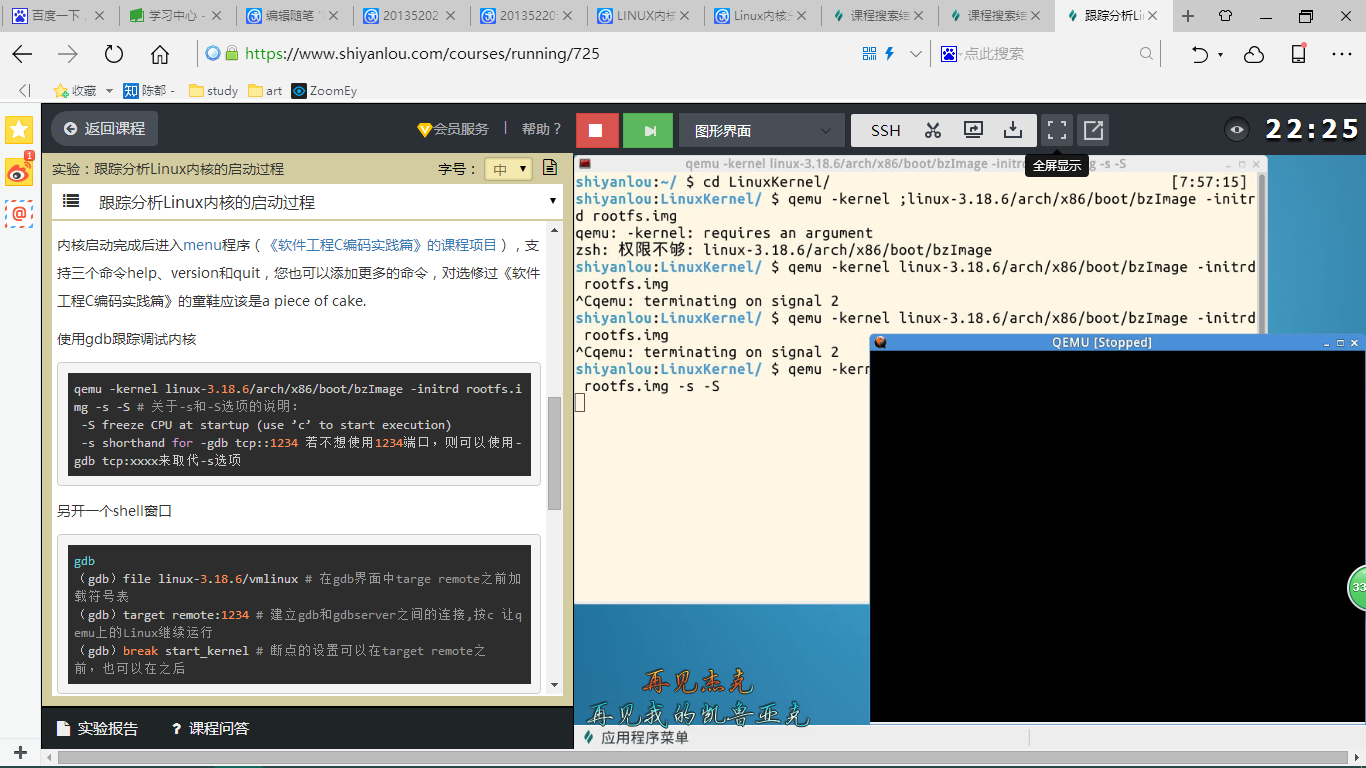linux内核分析第三周学习笔记
标签(空格分隔): 20135328陈都
陈都 原创作品转载请注明出处 《Linux内核分析》MOOC课程http://mooc.study.163.com/course/USTC-1000029000
构造一个简单的Linux系统MenuOS
上周回顾:
-
计算机三大法宝
-
存储程序计算机
-
函数调用堆栈
-
中断
-
操作系统两把宝剑
-
中断上下文的切换
-
进程上下文的切换
Linux内核源码简介
我们关注的部分
- arch/x86目录下的代码
- init/main.c中start_kernel函数就相当于普通C程序的main函数
- kernel目录:存放linux内核最核心的代码,用于实现系统的核心模块,包括进程管理、进程调度器、中断处理、系统时钟管理、同步机制等
README
提供内核的各种编译方法、生成文件的查看方法。
- installing 如何安装内核源代码
- make mrproper 清理安装时生成的中间代码
启动Linux内核的三个参数:
- kernel
- initrd
- root所在分区、目录
需要知道的一行代码:qemu -kernel (文件名) -initrd (rootfs.img)
qemu -kernel linux-3.18.6/arch/x86/boot/bzImage -initrd rootfs.img -s -S

使用gdb跟踪调试内核
qemu -kernel linux-3.18.6/arch/x86/boot/bzImage -initrd rootfs.img -s
-S # 关于-s和-S选项的说明:
-S freeze CPU at startup (use ’c’ to start execution)
-s shorthand for -gdb tcp::1234 若不想使用1234端口,则可以使用-gdb
tcp:xxxx来取代-s选项

另开一个shell窗口
gdb (gdb)file linux-3.18.6/vmlinux # 在gdb界面中targe remote之前加载符号表
(gdb)target remote:1234 # 建立gdb和gdbserver之间的连接,按c 让qemu上的Linux继续运行
(gdb)break start_kernel # 断点的设置可以在target remote之前,也可以在之后
总结分析start_kernel
start_kernel:包括很多模块的初始化。
分析内核都会涉及到start_kernel,都会在init初始化。
详细分析从start_kernel到init进程启动的过程
start_kernel函数的执行代码在init目录下的main.c[1]
500asmlinkage __visible void __init start_kernel(void)
501{
char *command_line;
char *after_dashes;
505 /*
* Need to run as early as possible, to initialize the
* lockdep hash:
*/
lockdep_init();
set_task_stack_end_magic(&init_task); init_task即手工创建的PCB,0号进程即最终的idle进程。
smp_setup_processor_id();
debug_objects_early_init();
514 /*
* Set up the the initial canary ASAP:
*/
boot_init_stack_canary();
519 cgroup_init_early();
521 local_irq_disable();
early_boot_irqs_disabled = true;
524/*
* Interrupts are still disabled. Do necessary setups, then
* enable them
*/
boot_cpu_init();
page_address_init();
pr_notice("%s", linux_banner);
setup_arch(&command_line);
mm_init_cpumask(&init_mm);
setup_command_line(command_line);
setup_nr_cpu_ids();
setup_per_cpu_areas();
smp_prepare_boot_cpu(); /* arch-specific boot-cpu hooks */
538 build_all_zonelists(NULL, NULL);
page_alloc_init();
541 pr_notice("Kernel command line: %s
", boot_command_line);
parse_early_param();
after_dashes = parse_args("Booting kernel",
static_command_line, __start___param,
__stop___param - __start___param,
-1, -1, &unknown_bootoption);
if (!IS_ERR_OR_NULL(after_dashes))
parse_args("Setting init args", after_dashes, NULL, 0, -1, -1,
set_init_arg);
551 jump_label_init();
553 /*
* These use large bootmem allocations and must precede
* kmem_cache_init()
*/
setup_log_buf(0);
pidhash_init();
vfs_caches_init_early();
sort_main_extable();
trap_init(); 涉及到中断的初始化
mm_init();
564 /*
* Set up the scheduler prior starting any interrupts (such as the
* timer interrupt). Full topology setup happens at smp_init()
* time - but meanwhile we still have a functioning scheduler.
*/
sched_init();
/*
* Disable preemption - early bootup scheduling is extremely
* fragile until we cpu_idle() for the first time.
*/
preempt_disable();
if (WARN(!irqs_disabled(),
"Interrupts were enabled *very* early, fixing it
"))
local_irq_disable();
idr_init_cache();
rcu_init();
context_tracking_init();
radix_tree_init();
/* init some links before init_ISA_irqs() */
early_irq_init();
init_IRQ();
tick_init();
rcu_init_nohz();
init_timers();
hrtimers_init();
softirq_init();
timekeeping_init();
time_init();
sched_clock_postinit();
perf_event_init();
profile_init();
call_function_init();
WARN(!irqs_disabled(), "Interrupts were enabled early
");
early_boot_irqs_disabled = false;
local_irq_enable();
600 kmem_cache_init_late();
602 /*
* HACK ALERT! This is early. We're enabling the console before
* we've done PCI setups etc, and console_init() must be aware of
* this. But we do want output early, in case something goes wrong.
*/
console_init();
if (panic_later)
panic("Too many boot %s vars at `%s'", panic_later,
panic_param);
612 lockdep_info();
614 /*
* Need to run this when irqs are enabled, because it wants
* to self-test [hard/soft]-irqs on/off lock inversion bugs
* too:
*/
locking_selftest();
621#ifdef CONFIG_BLK_DEV_INITRD
if (initrd_start && !initrd_below_start_ok &&
page_to_pfn(virt_to_page((void *)initrd_start)) < min_low_pfn) {
pr_crit("initrd overwritten (0x%08lx < 0x%08lx) - disabling it.
",
page_to_pfn(virt_to_page((void *)initrd_start)),
min_low_pfn);
initrd_start = 0;
}
629#endif
page_cgroup_init();
debug_objects_mem_init();
kmemleak_init();
setup_per_cpu_pageset();
numa_policy_init();
if (late_time_init)
late_time_init();
sched_clock_init();
calibrate_delay();
pidmap_init();
anon_vma_init();
acpi_early_init();
642#ifdef CONFIG_X86
if (efi_enabled(EFI_RUNTIME_SERVICES))
efi_enter_virtual_mode();
645#endif
646#ifdef CONFIG_X86_ESPFIX64
/* Should be run before the first non-init thread is created */
init_espfix_bsp();
649#endif
thread_info_cache_init();
cred_init();
fork_init(totalram_pages);
proc_caches_init();
buffer_init();
key_init();
security_init();
dbg_late_init();
vfs_caches_init(totalram_pages);
signals_init();
/* rootfs populating might need page-writeback */
page_writeback_init();
proc_root_init();
cgroup_init();
cpuset_init();
taskstats_init_early();
delayacct_init();
668 check_bugs();
670 sfi_init_late();
672 if (efi_enabled(EFI_RUNTIME_SERVICES)) {
efi_late_init();
efi_free_boot_services();
}
677 ftrace_init();
679 /* Do the rest non-__init'ed, we're now alive */
rest_init();
681}